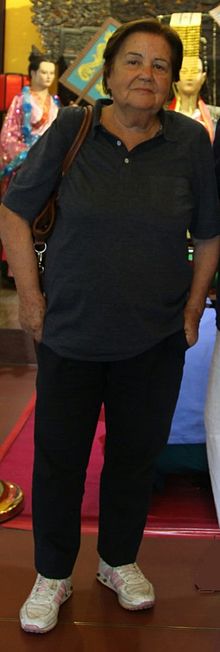Eduardo Blasco Ferrer was a Spanish-Italian linguist and a professor at the University of Cagliari, Sardinia. He is best known as the author of several studies about the Paleo-Sardinian and Sardinian language.

Grazia Maria Cosima Damiana Deledda, also known in Sardinian language as Gràssia or Gràtzia Deledda, was an Italian writer who received the Nobel Prize for Literature in 1926 "for her idealistically inspired writings which with plastic clarity picture the life on her native island [i.e. Sardinia] and with depth and sympathy deal with human problems in general". She was the first Italian woman to receive the prize, and only the second woman in general after Selma Lagerlöf was awarded hers in 1909.

Sardinian or Sard is a Romance language spoken by the Sardinians on the Western Mediterranean island of Sardinia.
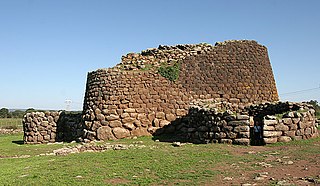
The nuraghe, or nurhag, is the main type of ancient megalithic edifice found in Sardinia, Italy, developed during the Nuragic Age between 1900 and 730 BC. Today it has come to be the symbol of Sardinia and its distinctive culture known as the Nuragic civilization. More than 7,000 nuraghes have been found, though archeologists believe that originally there were more than 10,000.

Cagliari is an Italian municipality and the capital and largest city of the island of Sardinia, an autonomous region of Italy. It has about 155,000 inhabitants, while its metropolitan city has about 420,000 inhabitants. According to Eurostat, the population of the functional urban area, the commuting zone of Cagliari, rises to 476,975. Cagliari is the 26th largest city in Italy and the largest city on the island of Sardinia.

Sassarese is an Italo-Dalmatian language and transitional variety between Sardinian and Corsican. It is regarded as a Corso–Sardinian language because of Sassari's historic ties with Tuscany and geographical proximity to Corsica. Despite the robust Sardinian influences, it still keeps its Corsican roots, which closely relate it to Gallurese; the latter is linguistically considered a Corsican dialect despite its geographical location, although this claim is a matter of controversy. It has several similarities to the Italian language, and in particular to the old Italian dialects from Tuscany.
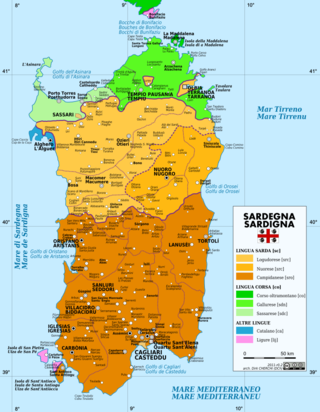
Campidanese Sardinian is one of the two written standards of the Sardinian language, which is often considered one of the most, if not the most conservative of all the Romance languages. The orthography is based on the spoken dialects of central southern Sardinia, identified by certain attributes which are not found, or found to a lesser degree, among the Sardinian dialects centered on the other written form, Logudorese. Its ISO 639-3 code is sro.
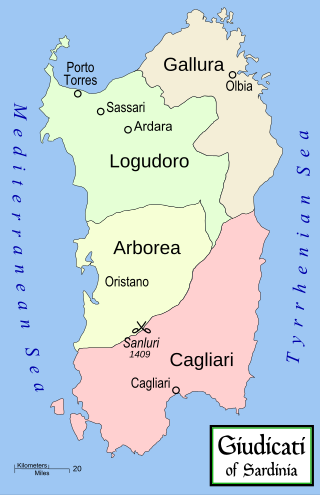
The Judicates, in English also referred to as Sardinian Kingdoms, Sardinian Judgedoms or Judicatures, were independent states that took power in Sardinia in the Middle Ages, between the ninth and fifteenth centuries. They were sovereign states with summa potestas, each with a ruler called judge, with the powers of a king.

The Sardinians, or Sards, are a Romance language-speaking ethnic group native to Sardinia, from which the western Mediterranean island and autonomous region of Italy derives its name.

The Perfect Fusion was the 1847 act of the Savoyard king Charles Albert of Sardinia which abolished the administrative differences between the mainland states and the island of Sardinia within the Kingdom of Sardinia, in a fashion similar to the Nueva Planta decrees between the Crown of Castile and the realms of the Crown of Aragon between 1707 and 1716 and the Acts of Union between Great Britain and Ireland in 1800.

Sardinian nationalism or also Sardism is a social, cultural and political movement in Sardinia calling for the self-determination of the Sardinian people in a context of national devolution, further autonomy in Italy, or even outright independence from the latter. It also promotes the protection of the island's environment and the preservation of its cultural heritage.
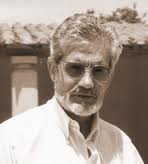
Giulio Angioni was an Italian writer and anthropologist.

The literature of Sardinia is the literary production of Sardinian authors, as well as the literary production generally referring to Sardinia as an argument, written in various languages.
Sardinian Literary Spring is a definition of the whole body of the literature produced in Sardinia from around the 1980s onwards.
Dolores Turchi is an Italian writer.

Milena Agus is an Italian author from Sardinia. She is one of the leading novelists in the so-called Sardinian Literary Spring which began in the 1980s and which includes other international names such as Michela Murgia.

Salvatore Satta was an Italian jurist and writer. He is famous for the novel The Day of Judgment (1975), and for several important studies on civil law.

Sardinia's Day, also known as Sardinian people's Day, is a holiday in Sardinia commemorating the Sardinian Vespers occurring in 1794–96.
The gosos or goccius (Sardinian) or goigs (Catalan) are a kind of devotional and paraliturgical songs sang pertaining to the folk tradition that are dedicated to the Virgin Mary, Jesus Christ, or a saint. They are typical of the Catalan Countries and Sardinia, and written in the Catalan, Sardinian or Spanish languages. They are sung during religious ceremonies, processions, pilgrimages and the votive festivals.
Shigeaki Sugeta is a Japanese linguist. Emeritus professor of General, Romance and Italian Linguistics at the University of Waseda, and now advisor to the Institute of Italian Studies of the same university, is the author of the first ever Sardinian-Japanese vocabulary.
